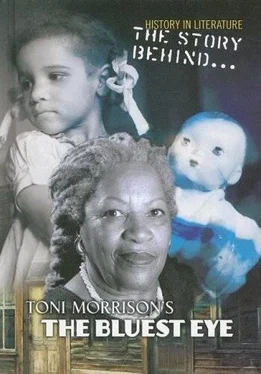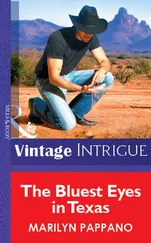Or did it? With a trembling hand he made the sign of the cross over her. His flesh crawled; in that hot, dim little room of worn things, he was chilled. "I can do nothing for you, my child. I am not a magician. I work only through the Lord. He sometimes uses me to help people. All I can do is offer myself to Him as the instrument through which he works. If He wants your wish granted, He will do it." Soaphead walked to the window, his back to the girl. His mind raced, stumbled, and raced again. How to frame the next sentence? How to hang on to the feeling of power. His eye fell on old Bob sleeping on the porch. "We must make, ah, some offering, that is, some contact with nature. Perhaps some simple creature might be the vehicle through which He will speak. Let us see." He knelt down at the window, and moved his lips. After what seemed a suitable length of time, he rose and went to the icebox that stood near the other window. From it he removed a small packet wrapped in pinkish butcher paper. From a shelf he took a small brown bottle and sprinkled some of its contents on the substance inside the paper. He put the packet, partly opened, on the table. "Take this food and give it to the creature sleeping on the porch. Make sure he eats it. And mark well how he behaves.
If nothing happens, you will know that God has refused you. If the animal behaves strangely, your wish will be granted on the day following this one." The girl picked up the packet; the odor of the dark, sticky meat made her want to vomit. She put a hand on her stomach. "Courage. Courage, my child. These things are not granted to faint hearts." She nodded and swallowed visibly, holding down the vomit. Soaphead opened the door, and she stepped over the threshold. "Good-bye, God bless," he said and quickly shut the door. At the window he stood watching her, his eyebrows pulled together into waves of compassion, his tongue fondling the worn gold in his upper jaw. He saw the girl bending down to the sleeping dog, who, at her touch, opened one liquid eye, matted in the corners with what looked like green glue. She reached out and touched the dog's head, stroking him gently. She placed the meat on the floor of the porch, near his nose. The odor roused him; he lifted his head, and got up to smell it better. He ate it in three or four gulps. The girl stroked his head again, and the dog looked up at her with soft triangle eyes. Suddenly he coughed, the cough of a phlegmy old man-and got to his feet. The girl jumped. The dog gagged, his mouth chomping the air, and promptly fell down. He tried to raise himself, could not, tried again, and half-fell down the steps. Choking, stumbling, he moved like a broken toy around the yard. The girl's mouth was open, a little petal of tongue showing. She made a wild, pointless gesture with one hand and then covered her mouth with both hands. She was trying not to vomit. The dog fell again, a spasm jerking his body. Then he was quiet. The girl's hands covering her mouth, she backed away a few feet, then turned, ran out of the yard and down the walk.
Soaphead Church went to the table. He sat down, with folded hands balancing his forehead on the balls of his thumbs. Then he rose and went to a tiny night table with a drawer, from which he took paper and a fountain pen. A bottle of ink was on the same shelf that held the poison. With these things he sat again at the table. Slowly, carefully, relishing his penmanship, he wrote the following letter: Att: TO HE WHO GREATLY ENNOBLED HUMAN NATURE BY CREATING IT Dear God: The Purpose of this letter is to familiarize you with facts which either have escaped your notice, or which you have chosen to ignore. Once upon a time I lived greenly and youngish on one of your islands. An island of the archipelago in the South Atlantic between North and South America, enclosing the Caribbean Sea and the Gulf of Mexico: divided into the Greater Antilles, the Lesser Antilles, and the Bahama Islands. Not the Windward or Leeward Island colonies, mark you, but within, of course, the Greater of the two Antilles (while the precision of my prose may be, at times, laborious, it is necessary that I identify myself to you clearly). Now. We in this colony took as our own the most dramatic, and the most obvious, of our white master's characteristics, which were, of course, their worst. In retaining the identity of our race, we held fast to those characteristics most gratifying to sustain and least troublesome to maintain.
Consequently we were not royal but snobbish, not aristocratic but class-conscious; we believed authority was cruelty to our inferiors, and education was being at school. We mistook violence for passion, indolence for leisure, and thought recklessness was freedom. We raised our children and reared our crops; we let infants grow, and property develop. Our manhood was denned by acquisitions. Our womanhood by acquiescence. And the smell of your fruit and the labor of your days we abhorred. This morning, before the little black girl came, I cried-for Velma. Oh, not aloud. There is no wind to carry, bear, or even refuse to bear, a sound so heavy with regret. But in my silent own lone way, I cried-for Velma. You need to know about Velma to understand what I did today. She (Velma) left me the way people leave a hotel room. A hotel room is a place to be when you are doing something else. Of itself it is of no consequence to one's major scheme. A hotel room is convenient. But its convenience is limited to the time you need it while you are in that particular town on that particular business; you hope it is comfortable, but prefer, rather, that it be anonymous. It is not, after all, where you live. When you no longer need it, you pay a little something for its use; say, "Thank you, sir," and when your business in that town is over, you go away from that room. Does anybody regret leaving a hotel room? Does anybody, who has a home, a real home somewhere, want to stay there? Does anybody look back with affection, or even disgust, at a hotel room when they leave it?
You can only love or despise whatever living was done in that room. But the room itself? But you take a souvenir. Not, oh, not, to remember the room. To remember, rather, the time and the place of your business, your adventure. What can anyone feel for a hotel room? One doesn't any more feel for a hotel room than one expects a hotel room to feel for its occupant. That, heavenly, heavenly Father, was how she left me; or rather, she never left me, because she was never ever there. You remember, do you, how and of what we are made? Let me tell you now about the breasts of little girls. I apologize for the inappropriateness (is that it?), the imbalance of loving them at awkward times of day, and in awkward places, and the tastelessness of loving those which belonged to members of my family. Do I have to apologize for loving strangers? But you too are amiss here, Lord. How, why, did you allow it to happen? How is it I could lift my eyes from the contemplation of Your Body and fall deeply into the contemplation of theirs? The buds. The buds on some of these saplings. They were mean, you know, mean and tender. Mean little buds resisting the touch, springing like rubber. But aggressive. Daring me to touch. Commanding me to touch. Not a bit shy, as you'd suppose. They stuck out at me, oh yes, at me. Slender chested, finger-chested lassies. Have you ever seen them, Lord? I mean, really seen them? One could not see them and not love them. You who made them must have considered them lovely even as an idea-how much more lovely is the manifestation of that idea. I couldn't, as you must recall, keep my hands, my mouth, off them. Salt-sweet. Like not quite ripe strawberries covered with the light salt sweat of running days and hopping, skipping, jumping hours. The love of them-the touch, taste, and feel of them-was not just an easy luxurious human vice; they were, for me, A Thing To Do Instead. Instead of papa, instead of the Cloth, instead of Velma, and I chose not to do without them. But I didn't go into the church. At least I didn't do that. As to what I did do? I told people I knew all about You. That I had received Your Powers. It was not a complete lie; but it was a complete lie. I should never have, I admit, I should never have taken their money in exchange for well-phrased, well-placed, well-faced lies. But, mark you, I hated it. Not for a moment did I love the lies or the money. But consider: The woman who left the hotel room. Consider: The greentime, the noontime of the archipelago. Consider: Their hopeful eyes that were outdone only by their hoping breasts. Consider: How I needed a comfortable evil to prevent my knowing what I could not bear to know.
Читать дальше











